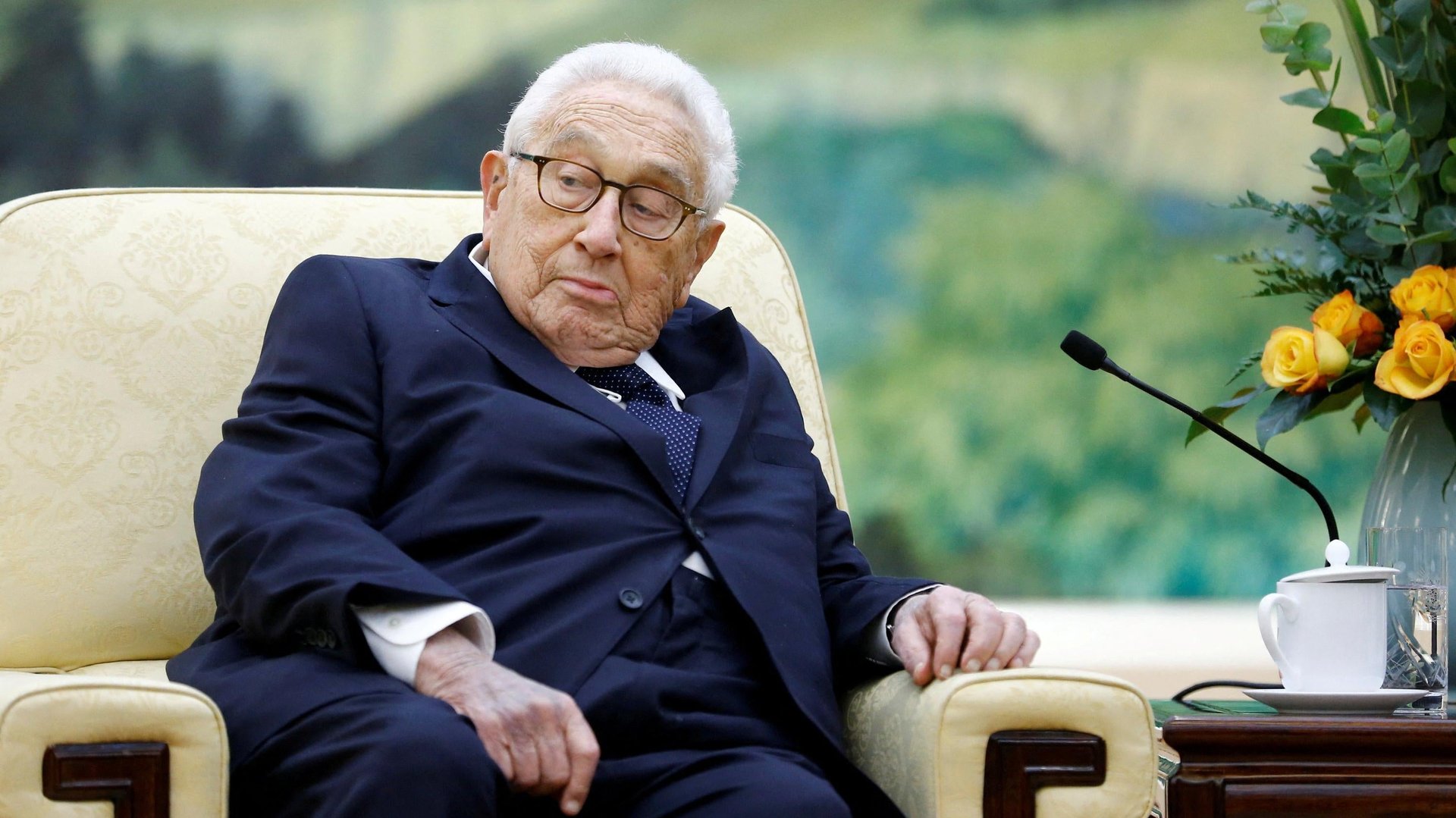Henry Kissinger, the controversial draftsman of US foreign policy, dies at 100
Kissinger’s own son was surprised at his father’s longevity

Scholar-turned-diplomat-turned-advisor Henry Kissinger died in his home in Connecticut yesterday (Nov. 29).
Suggested Reading
Kissinger, who turned 100 on May 27 this year, has been an influential albeit controversial figure in US politics since the 1970s—first as an academician, then as national security adviser and secretary of state, and then as a consultant and emissary to presidents and presidential hopefuls world over.
Related Content
Despite his dismissal of the anti-war movement and disdain for women, Kissinger lived most of his life as a celebrated figure among the rich and powerful in the US. For the rest of the world, not so much.
Even Kissinger’s son, David, was surprised at his father’s longevity. He called it “miraculous” in the face of “a diet heavy on bratwurst and Wiener schnitzel,” no sports on the schedule, and “a career of relentlessly stressful decision-making,” in a May op-ed in The Washington Post. According to David, what kept him alive then was perhaps his “unquenchable curiosity that keeps him dynamically engaged with the world.”
Kissinger is survived by his wife, Nancy Maginnes Kissinger, and two children Elizabeth and David.
A brief timeline of Henry Kissinger’s life
May 1923: Kissinger is born in Furth, Germany.
August 1938: The Jewish teenager, along with his family, flees the Third Reich and comes to New York to avoid further Nazi persecution.
World War II (1939-1945): Kissinger serves in the US Army, working as a translator in intelligence operations in Germany. He earned a Bronze Star for helping round up former members of the Gestapo—Adolf Hitler’s police force.
1947: Kissinger returns to the US—which he will later call a “second immigration”—and get his master’s and PhD at Harvard before joining the university’s faculty
1954-1958: Kissinger serves as a part-time consultant on foreign policy matters to various US agencies under John F Kennedy and Lyndon Johnson
1969: Kissinger serves as national security adviser and secretary of stat under Richard Nixon, and in...
...1974: he keeps the jobs under White House successor Gerald Ford after Nixon resigns
2021: Kissinger co-authors a book on artificial intelligence with former Google CEO Eric Schmidt and MIT computer scientist Daniel Huttenlocher
The 👍’s and 👎’s of Kissinger’s foreign moves
👎 Kissinger masterminded a “secret war,” illegally carpet bombing both Cambodia and Laos during the Vietnam War.
👎 Kissinger and Nixon were arguably complicit in Pakistan’s genocidal slaughter of 300,000 Bengalis, most of them Hindus, in 1970.
👎 Also in 1970, Kissinger apparently plotted to destabilize Chile’s Marxist elected president Salvador Allende’s government and trigger a military coup.
👍 He facilitated Nixon’s February 1972 visit to China and meeting with Chinese Communist Party (CCP) chairman Mao Zedong, ending nearly 25 years of diplomatic isolation between the US and China. Kissinger had already secretly been to Beijing twice in 1971.
👍 Kissinger cracked a landmark deal with the Soviet Union to curb the manufacture of strategic nuclear weapons in May 1972.
👍 His “shuttle diplomacy”—a term coined by the members of the media who trailed Kissinger on his various short flights among Middle East capitals—helped abate the fallout of the October 1973 Yom Kippur war, in which Egypt and Syria invaded Israel.
👎 In December 1975, Kissinger and Ford agreed to turn a blind eye to president Suharto of Indonesia’s invasion of East Timor. More than 100,000 East Timorese died during the Indonesian occupation through October 1999.
👎 In March 1976, Kissinger gave a “green light” to the Dirty War in Argentina, wherein a neofascist military junta overthrew president Isabel Perón and tortured, disappeared, and killed leftist dissidents that it branded as terrorists. An estimated 30,000 Argentine civilians died.
One big small number: Kissinger the workaholic
15 hours: How much time Kissinger claimed he spent working weeks before he turned 100.
Quotable: Henry Kissinger’s legacy
“He opened my eyes to bigger questions of geopolitics, statecraft, and even war and peace—or what he would call the world order. Overall, I think that he’s one of the few statesmen about whom I bet 100 years from now, the students at Harvard will still be reading and studying his statecraft.”
—Former Harvard Kennedy School Dean and professor Graham T. Allison Jr. ’62, a student of Kissinger’s at Harvard, in an interview with the Harvard Crimson
